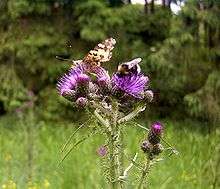Cirsium palustre
| Cirsium palustre | |
|---|---|
 | |
| Scientific classification | |
| Kingdom: | Plantae |
| (unranked): | Angiosperms |
| (unranked): | Eudicots |
| (unranked): | Asterids |
| Order: | Asterales |
| Family: | Asteraceae |
| Tribe: | Cynareae |
| Genus: | Cirsium |
| Species: | C. palustre |
| Binomial name | |
| Cirsium palustre (L.) Scop. | |
| Synonyms[1] | |
|
Synonymy
| |
Cirsium palustre, the marsh thistle[2] or European swamp thistle, is a herbaceous biennial (or often perennial) species of the genus Cirsium.[3][4]
Cirsium palustre is a tall thistle which reaches up to 2 metres (7 ft) in height. The strong stems have few branches and are covered in small spines. In its first year the plant grows as a dense rosette, at first with narrow, entire leaves with spiny, dark purple edges; later, larger leaves are lobed. In the subsequent years the plant grows a tall, straight stem, the tip of which branches repeatedly, bearing a candelabra of dark purple flowers, 10–20 millimetres (0.4–0.8 in) with purple-tipped bracts. In the northern hemisphere these are produced from June to September. The flowers are occasionally white, in which case the purple edges to the leaves are absent.[5]
It is native to Europe where it is particularly common on damp ground such as marshes, wet fields, moorland and beside streams. In Canada and the northern United States, it is an introduced species that has become invasive. It grows in dense thickets that can crowd out slower growing native plants. [6][5][7]
Ecology
Cirsium palustre is broadly distributed throughout much of Europe and eastward to central Asia. This thistle's occurrence is linked to the spread of human agriculture from the mid-Holocene era or before.[8] It is a constant plant of several fen-meadow plant associations, including the Juncus subnodulosus-Cirsium palustre fen-meadow.[8] The flowers are visited by a wide variety of insects, featuring a generalised pollination syndrome.[9]
References
- ↑ The Plant List, Cirsium palustre (L.) Coss. ex Scop.
- ↑ "BSBI List 2007". Botanical Society of Britain and Ireland. Archived from the original (xls) on 2015-02-25. Retrieved 2014-10-17.
- ↑ J. S. Rodwell. 1998. British Plant Communities, p. 227
- ↑ Altervista Flora Italiana, Cardo di palude, Sumpf-Kratzdistel, kärrtistel, Cirsium palustre (L.) Scop. includes photos and European distribution map
- 1 2 Flora of North America, European swamp or marsh thistle, cirse ou chardon des marais, Cirsium palustre (Linnaeus) Scopoli
- ↑ Marsh Plume Thistle, Aliens Among Us.
- ↑ Biota of North America Program 22014 county distribution map
- 1 2 C. Michael Hogan. 2009. Marsh Thistle: Cirsium palustre, GlobalTwitcher.com, ed. N. Strömberg
- ↑ Van Der Kooi, C. J.; Pen, I.; Staal, M.; Stavenga, D. G.; Elzenga, J. T. M. (2015). "Competition for pollinators and intra-communal spectral dissimilarity of flowers" (PDF). Plant Biology. doi:10.1111/plb.12328.
